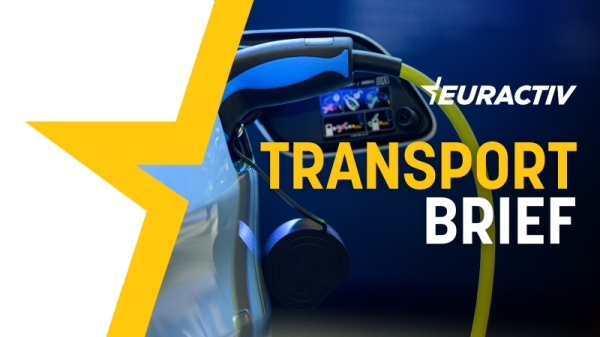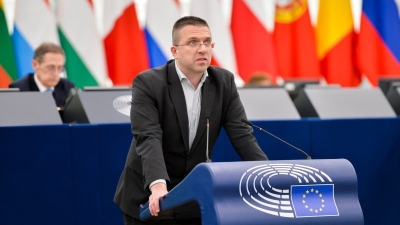Combustion engine ban: Germany’s ultimatum to the European Commission

Some clichés are clichés for a reason: A week truly is a long time in politics.
At the beginning of last week, the passage of the EU’s law on CO2 emission standards for cars and vans, which includes a de facto ban on the sale of combustion engine vehicles from 2035, seemed broadly on track.
Fast forward to today and everything has changed. At the time of writing, at least five member states have indicated they will not back the law.
A meeting to ratify the legislative proposal scheduled for today (7 March) – seen as a mere formality – has been cancelled. No new date has been proposed yet.
The timing of this reversal, at the very end of the legislative process, is largely unprecedented.
The reason for this great undoing of legislative tradition is essentially a domestic political squabble among Germany’s increasingly unstable government coalition.
Despite Germany having backed the deal at a Council meeting last November, the free-market FDP party (Renew Europe) began to suspect that a non-binding clause included in the text would not be enough to guarantee that combustion engines running on electricity-derived synthetic fuels would be saved.
Worried that right-wing rivals, the CDU (EPP), would paint them as the party that allowed the EU to destroy the combustion engine, a symbol of Germany’s engineering prowess, they took action.
Transport Minister Volker Wissing announced that the FDP would not back the deal unless the European Commission came forward with an assurance that they would put forward a legislative proposal on how e-fuels can be used to meet the zero-CO2 target.
Under the coalition rules, unless all governing parties agree to support a measure, Germany must abstain in EU votes.
After Germany retracted its support, other countries felt emboldened to do the same. As it stands, the four-country threshold for a blocking minority has been exceeded, with Czechia – the very country that brokered the deal with the European Parliament – the latest convert.
Strong-arming the European Commission
Germany’s demand that the Commission table a proposal on e-fuels puts the EU executive in a difficult position.
Ultimately, it is likely that the Commission will give some form of guarantee that they will prepare a report on e-fuels, if only to ensure the safe passage of a vital piece of Green Deal legislation.
Doing so will be something of an embarrassment for Commission Vice President Timmermans, who will need to acrobatically justify a stance that he himself has previously decried (e-fuels, Timmermans told reporters on 14 February, should not be used in road transport in “any way or form”).
But this is not beyond the capabilities of a skilled politician. Done correctly, Timmermans can largely save face, justifying the e-fuels proposal as part of the Commission’s commitment to technology neutrality and a means to assuage industry concerns.
What is harder to justify, and ultimately more damaging, is the perception that the Commission can be strong-armed by a powerful member state into making statements that it may not wish to make.
The latest chapter in the saga of the combustion engine ban will no doubt revive the perception that although the EU is a club of equals, some members are more equal than others.
It seems at this late stage that the Commission has no choice but to cave to Berlin’s demands. One could argue that it is logical to do so and that the request is not particularly onerous.
But the image of the union’s largest member state forcing the Commission to bow to its will will be harder to shake.
Today’s edition is powered by CPK
CPK project as a role model for sustainable airport
Centralny Port Komunikacyjny is a globally unique combination of railway investments and a new hub airport for Poland and CEE that is expected to be Net Zero Ready. From sustainable building certification to reducing GHG emissions, CPK sets new standards for sustainable airports in the region.
Find out more >>
Charging infrastructure file’s negotiator fires warning shot at Swedish presidency
The European Parliament’s chief negotiator for the Alternative Fuels Infrastructure Regulation (AFIR), Ismail Ertug (S&D), has fired a warning shot at Sweden, which is currently leading the negotiations for EU countries.
“The 27th of March is the day of days for us,” Ertug said with regards to the next, and hopefully last, trilogue negotiation on the law to strengthen charging and hydrogen infrastructure across EU main roads.
“But if we have the impression that this is not acceptable, then there will be no conclusion,“ he said. “And then we will set a new trilogue date, but it will no longer be during the Swedish Presidency,” Ertug added.
Ertug criticised the Council negotiators for not showing a willingness to compromise during the previous round of negotiations, which took place last week.
While the Parliament’s delegation showed areas where it is willing to move closer to the Council’s position, the Council side did not reciprocate.
“I made it clear to the Council that they must not think that this will then also be the case in the next trilogue,” he said.
While EU countries fear that the high ambition of the European Parliament to expand charging and hydrogen infrastructure comes at too heavy a price, Ertug said that the Parliament is supported by both environmental NGOs and the automotive industry.
The latter would be “the one to suffer if there is no solution” on charging infrastructure, as they would have to pay fines if the uptake of electric mobility does not go as planned, Ertug said.
“Member states have to take responsibility for the infrastructure development,” he said.
Grief turns to anger in wake of Greek train tragedy
Greece continues to reel from the catastrophic train accident which claimed the lives of at least 57 people last Tuesday (28 February), with the mood in the country turning from sorrow to anger.
The crash occurred when a high-speed passenger train collided head-on with a freight train near the city of Larissa. The impact of the crash threw carriages from the tracks and sparked an inferno.
Now, pointed questions are being raised over the safety standards of the train system, with most ire directed at the government and rail company.
“Pain has turned into anger for the dozens of dead and wounded colleagues and fellow citizens,” the railway workers’ union said in a statement.
A protest attended by some two thousand people took place in Athens on Thursday (2 March), with other protests staged across the country.
It is understood that the tragedy will have huge political costs for the current government, headed by conservative Prime Minister Kyriakos Mitsotakis, as the nation prepares for elections in April.
The Greek leader vowed to put forward new railway safety measures and to use EU funds to modernise the country’s rail system.
“I apologise personally but also in the name of all those who have governed the country for years because, indeed, in Greece in 2023, it is impossible for two trains to move in opposite directions on the same line, and no one has noticed,” he said.

A roundup of the most captivating transport news.
Scholz backs transport minister in attempt to save combustion engine
German Chancellor Olaf Scholz has voiced his support for liberal Transport Minister Volker Wissing’s threat to block the final vote on the EU’s de facto ban on new petrol or diesel cars as of 2035.
Anger at Germany as vote to finalise combustion engine ban is delayed
EU diplomats reacted with surprise and annoyance to Germany’s last-minute refusal to back a ban on the sale of new combustion engine cars by 2035, which has led to a postponement of the vote to approve the law.
Will efforts to ban the combustion engine fall at the final hurdle?
With the news that Germany may abstain from a vote on ending the production of new petrol and diesel cars by 2035, the fate of the long-negotiated law on CO2 standards for cars and vans is now uncertain.
Anger, sorrow in Greece as train crash death toll rises
Anger and sorrow grew in Greece on Thursday (2 March) over a devastating train crash that killed dozens of passengers along with crew members near the central city of Larissa in the country’s worst rail disaster.
Czechia, Germany, team up for synthetic fuel use after combustion engine ban
Czechia, together with Germany, will not back the EU ban on the sale of new petrol or diesel cars from 2035 if synthetic fuels cannot be used, said Czech Transport Minister Martin Kupka after a meeting with his German counterpart Volker Wissing in Berlin.



